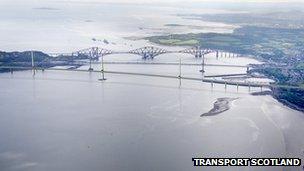Scottish transport projects will cost £7.5bn over 30 years
- Published

The new Forth Crossing is on track to be built on time and within budget
Scotland's five largest transport projects will cost the taxpayer £7.5bn over the next three decades, the public spending watchdog has revealed.
It criticised the Scottish government for not publicising the combined costs.
The Scottish government said that it would see where improvements could be made.
Audit Scotland also said the government must demonstrate that the spending was affordable.
'Demonstrate affordability'
The government and its agency Transport Scotland were told to "improve their public reporting" of infrastructure projects to the public and the Scottish Parliament.
Auditor General for Scotland Caroline Gardner said: "The estimated full public spending commitment for these five projects has not been reported until now and the forecast building costs for some have been incompletely or inconsistently reported.
"These projects will cost an estimated £3.8bn to build and will tie up about £7.5bn of public money over 30 years.
"It is important for the Scottish government to demonstrate that this spending is affordable."
Ms Gardner said the five key transport projects - the Forth Replacement Crossing, the Aberdeen bypass, the Edinburgh-Glasgow Rail Improvement Programme, the upgrading of the M8 and other motorways in the central belt and the Borders railway - were central to the Scottish government's aim of strengthening Scotland's economy and recovery.
The five projects will cost a combined £3.8bn to build but the estimated combined budget commitment over 30 years, reflecting building, financing and operating costs, is £7.5bn.
Ms Gardner added: "It is encouraging that all are currently on track to be built within budget and four are on time.
"Transport Scotland and the Scottish government need to improve their reporting on major projects to the public and to the Scottish Parliament."
'On-budget'
The Forth bridge was the only project where full costs had been reported, Audit Scotland said in a report on their findings.
Auditors also looked at changes to the delivery of the Edinburgh-Glasgow rail improvements and the Borders line.
The report noted that 30-year costs were "commercially sensitive" in both cases.
Transport Minister Keith Brown welcomed conclusions that the "centrepiece" Forth Crossing project had sound management, was on budget and on target.
He said: "Whilst this report provides us with useful assurance around our governance and risk management procedures, we will take forward the recommendations to see where further improvements can be made and I look forward to leading a debate in the Scottish Parliament on major transport projects later in the year."
Scottish Labour's transport spokeswoman Elaine Murray said: "It's particularly worrying that the Edinburgh-Glasgow Improvement Project has no current business case as we have the SNP and Transport Scotland telling us they are on track when in fact it is two years behind schedule and massively scaled back.
"This is a slap on the wrist for the SNP who now must ensure that the identified shortfall in transparency and accountability for these projects is rectified swiftly."
Scottish Liberal Democrat transport spokesperson Tavish Scott said the SNP government must go "above and beyond" to improve public trust in the delivery of major infrastructure projects.
He said: "After chaos around Borders Rail and the AWPR (Aberdeen Western Peripheral Route) it's clear that sunshine is the best medicine.
"These are sensible recommendations which will go some way to ensure that transparency is being improved at every opportunity."
Scottish Conservative transport spokesman Alex Johnstone said: "Of course any investment in infrastructure is welcome, and we are fully supportive of all of these projects.
"But we simply cannot afford for them to spiral out of control, and that is a risk if the SNP continues to be secretive about the costs involved.
"It is just not good enough for the Scottish government to close its eyes and worry about the money later - no doubt it thinks in a separate Scotland we could just print more money to pay for them."